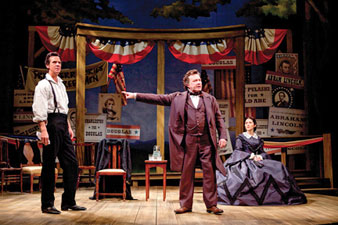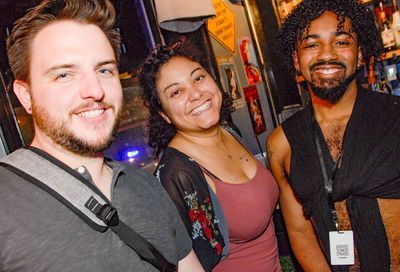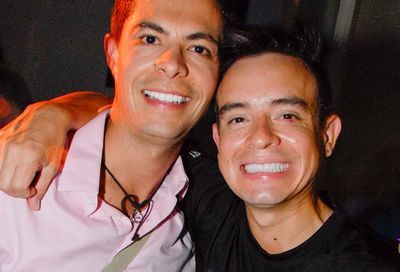Siblings and Rivalries
The Rivalry dramatizes the great Lincoln-Douglas debates, while Three Sisters is simple without being austere
When watching a play that includes Abraham Lincoln, the question begs to be asked: Is this a play about Lincoln the politician, or Lincoln the symbol?
In the cold light of day these are actually two very different men.

The Rivalry
(Photo by T. Charles Erickson)
Norman Corwin’s 1958 play The Rivalry, which sets as its revolving point the Lincoln-Douglas debates of 1858, offers a carefully measured cocktail of each. There are the clever self-deprecations of the near-mythic showman (”If I were two faced would I be wearing this one?”), paired to the physical exhaustion of an ambitious man fighting for the nearly impossible. How could a young, upstart Senate candidate from Illinois hope to run a successful campaign against a highly popular incumbent at a time when the country was being torn apart by internal strife?
The production now at Ford’s Theatre presents a fine display of both Lincolns while offering refreshing humanity to the often overlooked figure of Sen. Stephen Douglas.
Unfortunately, what begins as feeling energetic and new – despite the time that has passed between the play’s first performance and this latest effort – slowly slips into a dated melancholy. The coy winks that have aided our evening’s journey suddenly abandon us and we are left with only dusty artifacts.
The Rivalry begins following Lincoln (Robert Parsons) and Douglas (Rick Foucheux) in the days before the first debate. Our guide for the play is Douglas’s wife Adele (Sarah Zimmerman). A woman of great influence and even greater insight, the character of Adele is the voice of reason. Despite loyalty to her husband, she offers a vantage point that is faultlessly reliable and bracingly honest. And while the show offers the obvious enjoyment for the history fan or Lincoln buff (there aren’t a great number of Douglas buffs floating about), it has been shot through with enough contemporary nods to suit a D.C. audience quite well.
Foucheux has, in some regards, the heavier weight to pull, playing a famous man that most would not be able to recognize in the proverbial lineup. What he delivers is a performance that is humorous, engaging and brilliantly executed. The actor’s charming, keen portrayal reminds us that these debates were hardly one-sided affairs. They were an intellectual prizefight.
Parsons has his own large shoes to fill. It is certainly a great boon to bear some physical resemblance to Lincoln when playing this role, but the danger exists in simply being seen as an historical theme-park employee. Parsons avoids this trap by holding close to the Lincoln who was a human being. He is unafraid to show us physical vulnerability and weariness. He tempers symbol with unapologetic reality.


 and a half stars
and a half starsFord’s Theatre
To Feb. 14
$10-$55
202-397-7328
fordstheatre.org
When all is said and done, it’s Zimmerman who shines the brightest. Here is an actress who can cast a shy smile to the back of the house. She crosses the stage with a determined posture that lets everyone know she is absolute control. Zimmerman is a master of the subtle gesture and leads this ensemble with great authority.
The greatest fault to be found in The Rivalry is that it becomes too secure in how finely tuned a production it is. It seems to forget that Lincoln shows do not have a surprise ending in store which makes holding the audience’s attention all the greater a challenge. There is no true rising tension, no new discoveries to be made.
That is when a director like The Rivalry‘s Mark Ramont must devise a means for bringing a satisfying resolution to a story already resolved in the minds of the audience. With Ford’s offering that does not happen and we are left, instead, to simply fade off into dim silence.
ANTON CHEKHOV’S GREATEST enemy is (as was the case for many of us) high school. At some point in everyone’s high school career some English teacher handed out a copy of The Cherry Orchard and said it was a masterpiece.
But here’s the thing. It wasn’t.
Or, it was, but it was a masterpiece that was never really meant to be read alone in a room with a piece of paper asking you to name the three major themes while preparing for a ”compare and contrast” exam. Chekhov plays, like Three Sisters, are meant to be experienced. Otherwise, what you are left with is a whole lot of pages crowded with a whole lot of people with extraordinarily complicated names talking about how they want to go to Moscow.
Particularly lucky high school students – and their parents, their parents’ friends and perhaps visiting Muscovites – will be able to see a Chekhov play as it is meant to be seen if they make the trip to Constellation Theatre. The troupe’s current production of Three Sisters is simple without being austere, sad without devolving into melodrama. A right balance is even found in the touch of madness which rounds out the evening. It’s a wonderful production that gives attention to the lyricism of Lanford Wilson’s translation and pays respect to Chekhov’s ideas of the solitary nature of longing.




Constellation Theatre
To Feb. 21
$15-$25
800-494-8497
constellationtheatre.org
The argument could be made that Three Sisters is something of a live theater chick flick (to be sure, a very good thing). The story of three very different women dreaming of things seemingly beyond their reach. Irina (Amy Quiggins) wants to leave the small village she and her sisters are living in and return to Moscow. Masha (Catherine Deadman) wants to leave her strained marriage to find true love and Olga (Nanna Ingvarsson) wants the most impossible thing of all: for she and her sisters to be happy.
Quiggins, Deadman and Ingvarsson offer outstanding individual performances while serving as dynamic counterparts to one another. They amplify one another, urging and supporting lovely, full characterizations. Three Sisters will not make you want to go back to high school. It may, however, make you long to return to Moscow.
Support Metro Weekly’s Journalism
These are challenging times for news organizations. And yet it’s crucial we stay active and provide vital resources and information to both our local readers and the world. So won’t you please take a moment and consider supporting Metro Weekly with a membership? For as little as $5 a month, you can help ensure Metro Weekly magazine and MetroWeekly.com remain free, viable resources as we provide the best, most diverse, culturally-resonant LGBTQ coverage in both the D.C. region and around the world. Memberships come with exclusive perks and discounts, your own personal digital delivery of each week’s magazine (and an archive), access to our Member's Lounge when it launches this fall, and exclusive members-only items like Metro Weekly Membership Mugs and Tote Bags! Check out all our membership levels here and please join us today!























